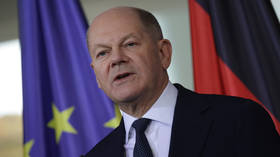German president ready to approve early elections
Chancellor Olaf Scholz has scheduled a vote of confidence after the collapse of his governing coalition
German President Frank-Walter Steinmeier said on Thursday he was ready to call a snap parliamentary election as soon as he is required to do so. He was reacting to the collapse of the nation’s governing coalition the day before.
Steinmeier formally released three federal ministers from their positions: Finance Minister Christian Lindner, who was fired by Chancellor Olaf Scholz late on Wednesday, Justice Minister Marco Buschmann and Education Minister Bettina Stark-Watzinger.
All three ministers represented the pro-business Free Democratic Party (FDP). The FDP, which was one of three parties comprising the coalition together with the chancellor’s Social Democrats and the Greens, announced its withdrawal in response to Lindner’s dismissal. The move left Scholz with a minority government consisting only of his own party and the Greens.
In the wake of the breakup, the chancellor announced he would ask for a vote of confidence in mid-January. Should the government lose it, snap elections could be scheduled for March 2025, Scholz said. Germany is due to hold regular parliamentary elections in September.
On Thursday, Steinmeier described the developments as something that “has rarely happened” in the 75-year-long history of modern Germany. The president would have to “decide on the dissolution” of the parliament if it signals a lack of confidence in the government. “I stand ready for this decision,” he stated.
According to Steinmeier, the German constitution sets specific requirements for dissolving parliament early. The president maintained that “our country needs a stable majority and a government that is capable of acting,” saying that this would be his only criterion for the decision.
“It is time for reason and responsibility,” Steinmeier said, adding that he expected “all those responsible to be up for the scale of the challenges.”
On Wednesday, German media reported that Lindner had been fired after he supposedly proposed early elections when the leaders of the three coalition parties once again failed to find common ground on how to address a multibillion-euro deficit in next year’s budget. The former coalition partners have been at odds over economic policy for months.
On Thursday, Scholz admitted that aid to Ukraine had become a major point of contention. According to the chancellor, he put forward a four-point plan that included “increasing our support for Ukraine,” which Lindner rejected.
You can share this story on social media:








Comments are closed.